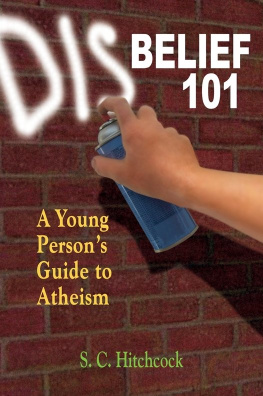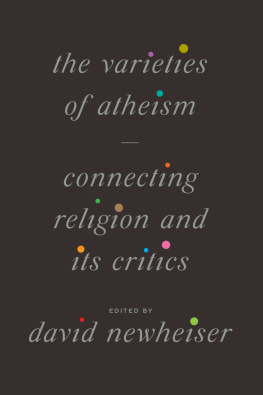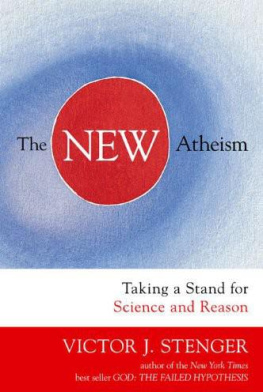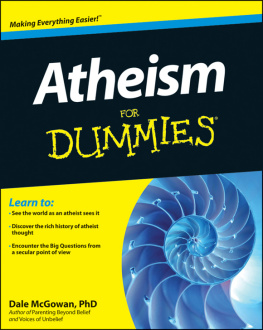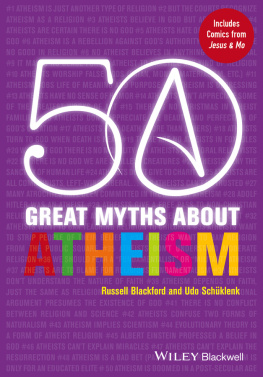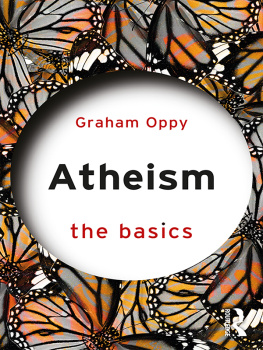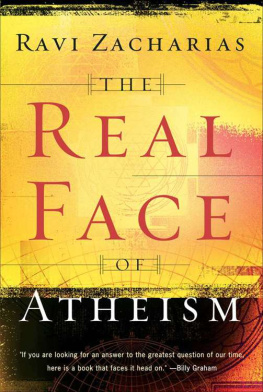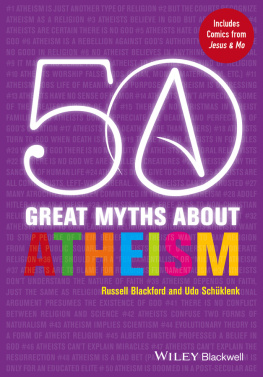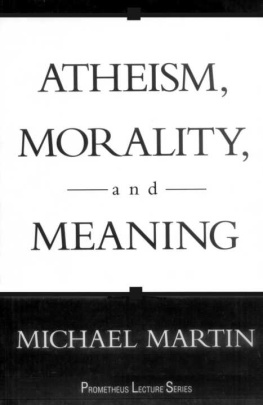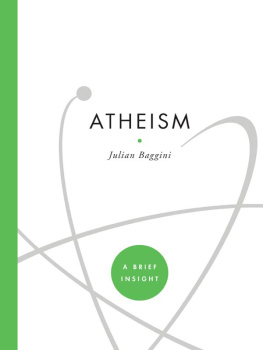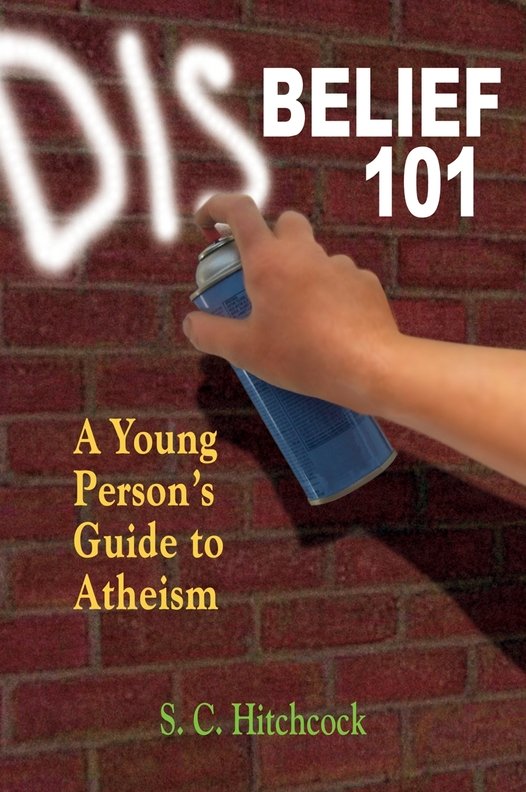No one writes a book alone, and Id like to thank a number of people who made this book possible. First and foremost, Id like to thank my wife, who always seems to understand when I need time to write. Id like to thank Chaz Bufe of See Sharp Press for taking a chance on this book and for his always wise editorial guidance. Tom Flynn deserves my gratitude for being an early reader, for his sage advice on all things godless, and for his fine introduction. Sharon Berger, too, gave me good advice. Id also like to thank Ashley Grayson for his early advocacy. Finally, many other atheists and humanists were early readers, and I have come to believe that there are no people more generous of spirit than those who do not believe.
Bibliography
Cantor, Norman F. In the Wake of the Plague: The Black Death and The World It Made . New York: Perennial, 2001.
Chapman, Matthew. 40 Days and 40 Nights: Darwin, Intelligent Design, God, Oxycontin and Other Oddities on Trial in Pennsylvania . New York: Collins, 2007.
Crosby, Alfred W. Throwing Fire: Projectile Technology Throughout History . Cambridge: Cambridge University Press, 2002.
Darwin, Charles. The Origin of Species. London : Penguin Books, 1985.
Dawkins, Richard. The God Delusion . Boston: Houghton-Mifflin Company. 2006.
Dawkins, Richard. The Ancestors Tale: A Pilgrimage to the Dawn of Evolution . Boston: Houghton-Mifflin Company, 2004.
Diamond, Jared. Guns, Germs, and Steel . New York: W.W. Norton and Company, Inc., 1999.
God, Almighty. Holy Bible New Revised Standard Edition. Nashville: Thomas Nelson Publishers. 1989.
Gould, Stephen Jay. Rocks of Ages: Science and Religion in the Fullness of Life . New York: Ballantine Books, 1999.
Harris, Sam. Letter to a Christian Nation . New York: Alfred A. Knopf, 2006.
Harris, Sam. The End of Faith: Religion, Terror, and the Future of Reason . New York: W.W. Norton and Company Inc., 2004.
Hawking, Stephen. A Brief History of Time . New York: Bantam Books. 1996.
Hecht, Jennifer Michael. Doubt: A History . San Francisco: HarperCollins, 2003.
Hitchens, Christopher. God Is Not Great: How Religion Poisons Everything . New York: Twelve Books, Hachette Book Group, 2007.
Loewen, James W. Lies My Teacher Told Me . New York: Simon and Schuster, 1995.
Mlodinow, Leonard. The Drunkards Walk: How Randomness Rules Our Lives . New York: Pantheon Books, 2008.
Nicholson, Adam. Gods Secretaries: The Making of the King James Bible . New York: HarperCollins, 2003.
Shermer, Michael. Why People Believe Weird Things: Pseudoscience, Superstition, and Other Confusions of Our Time . New York: Owl Book Henry Holt and Co., 1997.
Stenger, Victor J. God the Failed Hypothesis: How Science Shows that God Does Not Exist . New York: Prometheus Books, 2008.
$9.95
With Disbelief 101, S. C. Hitchcock has given the world something achingly special: a book that addresses precisely the fears and obsessions that seize young people of rock-ribbed faith when they first begin to doubt. If you know a young doubter, give her or him this book. If you are a young doubter, keep reading. And welcome home.
Tom Flynn. editor Free Inquiry magazine and A New Encyclopedia of Unbelief
What do cigarettes, Big Macs, and religions have in common? Their sellers like to snare the buyer young. S.C. Hitchcock offers no antidote to lung cancer or obesity, but his intelligent, lucid and compassionate book does offer hope and ammunition to any kid smart enough tostispect that his weekly trip to church, temple or mosque has more to do with indoctrination than truth or reason.
Matthew Chapman, author of Trials of The An Accidental Memoir and 40 Days and 40 Nights: Darwin, Intelligent Design, God, OxyContin, and Other Oddities on Trial in Pennsylvania
This breezy case for atheism fills an important niche in the increasingly popular literature on the new atheism. Most religious indoctrination begins in childhood and the author provides a good basis for the transition from blind faith and superstition to clear and free thinking.
Victor J. Stenger, Author of the New York Times bestseller, God: The Failed Hypothesis
Bold, blunt, and funny, Disbelief 101 is full of clever observations and insight. This book will open more than a few eyes.
Jennifer Michael Hecht, author of Doubt: A History and The End of the Soul
The Invisible Flying Clown
We might as well begin by picking on the Judeo-Christian god. Hes no more real than any of the other gods, but he does hold a more prominent place in the English-speaking world than those funny Eastern gods, some of whom have more than their share of arms!
All of the arguments for the existence of the Christian god are as absurd as the arguments for a Muslim god, Hindu gods, a Norse god, or Greek gods. The only thing these arguments have going for them is fear. The notion of an all-knowing, all-powerful god was forced into your mind when you were young, and the fear has stayed. Even people who arent raised in a religious home can easily pick up the idea of a god, and a fear of him, from the culture. So lets not use the term god: it conjures up fear when it should conjure up laughter. Below, youll find a typical dialogue between a non-believer and a Christian, only well replace the word god with Invisible Flying Clown. If you find the idea of an Invisible Flying Clown to be crazy, good. Rest assured that it is no crazier than the notion of a god. The evidence for the existence of both is exactly the same.
Believer: You should believe in the Invisible Flying Clown.
Nonbeliever: An Invisible Flying Clown?!
Believer: The ClownIFC for shortis an all-powerful force for good. He created the entire universe out of nothing about 6,000 years ago and watches our every move, reads our every thought, and will one day judge us for our actions.
Nonbeliever: What does the IFC want?
Believer: He only asks that we believe in Him, and believe that part of Him came to the Earth as a human/god (we havent quite worked this part out, so we call it a holymystery), was born of a virgin, walked on water, healed the sick by touching them, was crucified, and came back from the dead three days later.
Nonbeliever: What will happen if I dont believe in the IFC?
Believer: Well, he will punish you.
Nonbeliever: Okay, I dont believe in him. Why isnt he punishing me?
Believer: Not now, stupid, after youre dead. If you dont believe in him, or accept that part of him came to earth as a half-human mystery man, walked on water, was executed, and all the rest, then youll burn in a place called hell for all eternity.
Nonbeliever: What do I get for believing in the IFC?
Believer: Big rewards.
Nonbeliever: Like what? What rewards have you gotten so far?
Believer: Not now, stupid. Ill get them after Im dead. Ill go to heaven and live with the IFC in eternal bliss, singing his praises and playing with the dog I had that died when I was a kid.
Nonbeliever: How do you know the IFC exists?
Believer: Well, the book he gave us tells us so.
Nonbeliever: What else is in this book?

